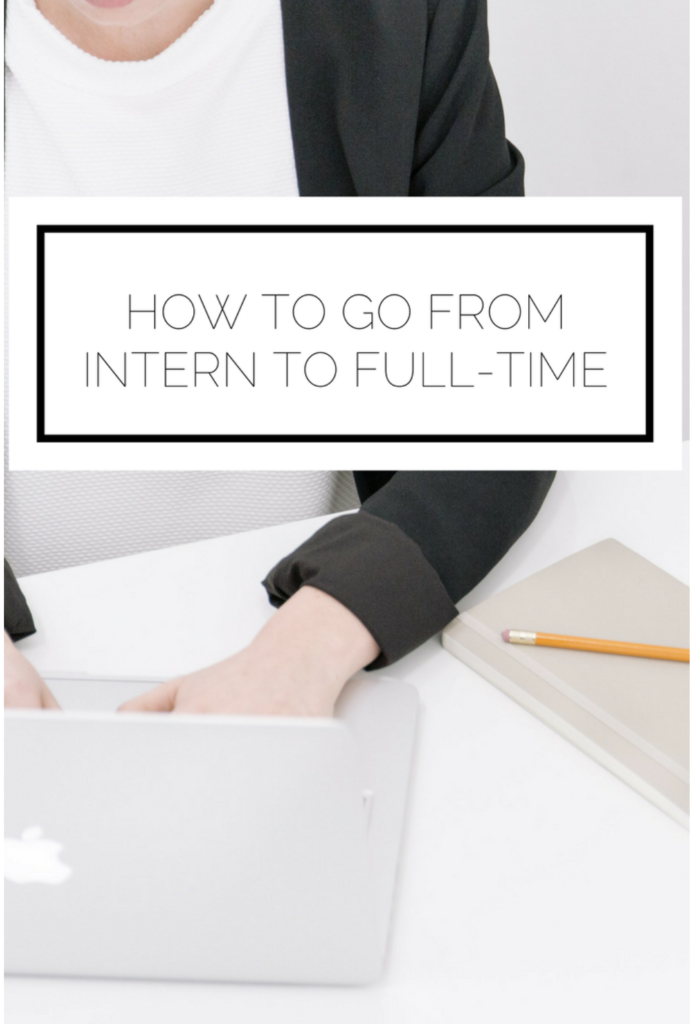If there’s anything that I love discussing, it’s professional development. Whether it’s about developing your skill set, networking, or getting a job, I get beyond excited to talk about it. Today I’m partnering up with my friend Austen (you can read about the start of our friendship and reconnection years later here) of Keep Calm and Chiffon who interned at NYLON magazine and now works there full-time. We’re going to answer a series of questions about transitioning your internship to a full-time job, just like we both did (you can take a look at my IBM internship experience here and I am thrilled to say I’ll be starting full-time in June)!

How do you know if where you interned is also where you should look for a full-time position?
Austen: I can usually get a good feeling about this based on the kind of relationships I’ve formed with supervisors and other interns. If you feel comfortable and think it’s a place where your ideas would be heard and where you could learn a lot, then it’s definitely worth looking into for a more permanent position.
Alyssa: Getting the opportunity to intern before making the more major decision of where you are going to work full time is phenomenal. Make the most of your time as an intern by talking to as many people in a variety of roles as you can to learn about all of the potential functions in the company. If you feel it is a place you were challenged and where people were willing to help, those are good indications that you should consider transitioning to full-time.
What was your first step when you knew you wanted to turn your internship into a full-time job?
Austen: I think I knew I wanted something more the moment I walked into my first fashion internship! I just thought about how every little action could eventually help get me to my goal—that meant strategically planning every blog post, every networking email, and even every outfit posted to Instagram was somehow building to getting a job at a fashion magazine.
Alyssa: Step one was to let my managers and colleagues know that I was interested. Step two was to consistently demonstrate why I would be a valuable addition to their team. The more you can aid others in their roles by making their lives easier, the more inclined they will be to want you to continue with the company. By showing genuine and enthusiastic interest, with a strong desire to learn, you can develop advocates who will help you through the hiring process.
How can you take on more responsibility and not be viewed as an intern once you’re full-time?
Austen: If you’re working where you’ve previously interned, it may take a little while for the intern feeling to go away. A lot of physically different things will help to distinguish your new status as an employee—having your own computer, a business card, that sort of thing. If your boss is still hesitant to give you bigger tasks, offer your assistance, pitch ideas, and absorb everything that’s happening around you. Interns solve problems after they happen—employees anticipate problems and cut them off before they occur.
Alyssa: Not sure yet (because I haven’t started my full time role), but I’ll get back to you 🙂 How do you recommend preparing to negotiate your offer?
How do you communicate your value and make sure that you are getting the best fit and compensation?
Austen: This is tricky, because it’s awesome to get any offer upon graduation and I didn’t have to negotiate mine. If you’re not thrilled with your initial offer, but know the job is a great fit, ask to plan a check-in after six months to potentially re-evaluate and negotiate your salary. If you are a great fit and are doing exemplary work, the company should want to invest in you and want to keep you around.
Alyssa: Negotiations are tough, but can be necessary. Since you have already been demonstrating what you bring to the table as an intern, you have a leg up. Come to any discussion prepared with research on what other company entry-level salaries are for your role and practice articulating what you have and will contribute, especially what that means for the success of the company and the achievement of their goals. Be prepared to be creative. Maybe more money is not a possibility, but additional training and professional development opportunities can be made available if you ask, or you can secure a more advantageous relocation package. I love Austen’s suggestion of agreeing on another time to discuss it! Lastly, remember those great relationships you made through the course of your internship? Consult with them about the preferred method of negotiating in this company and get their feedback on what you should be asking for/how to ask for it.
Do you have any other questions about making the transition? Any ideas we didn’t share?



Leave a Reply